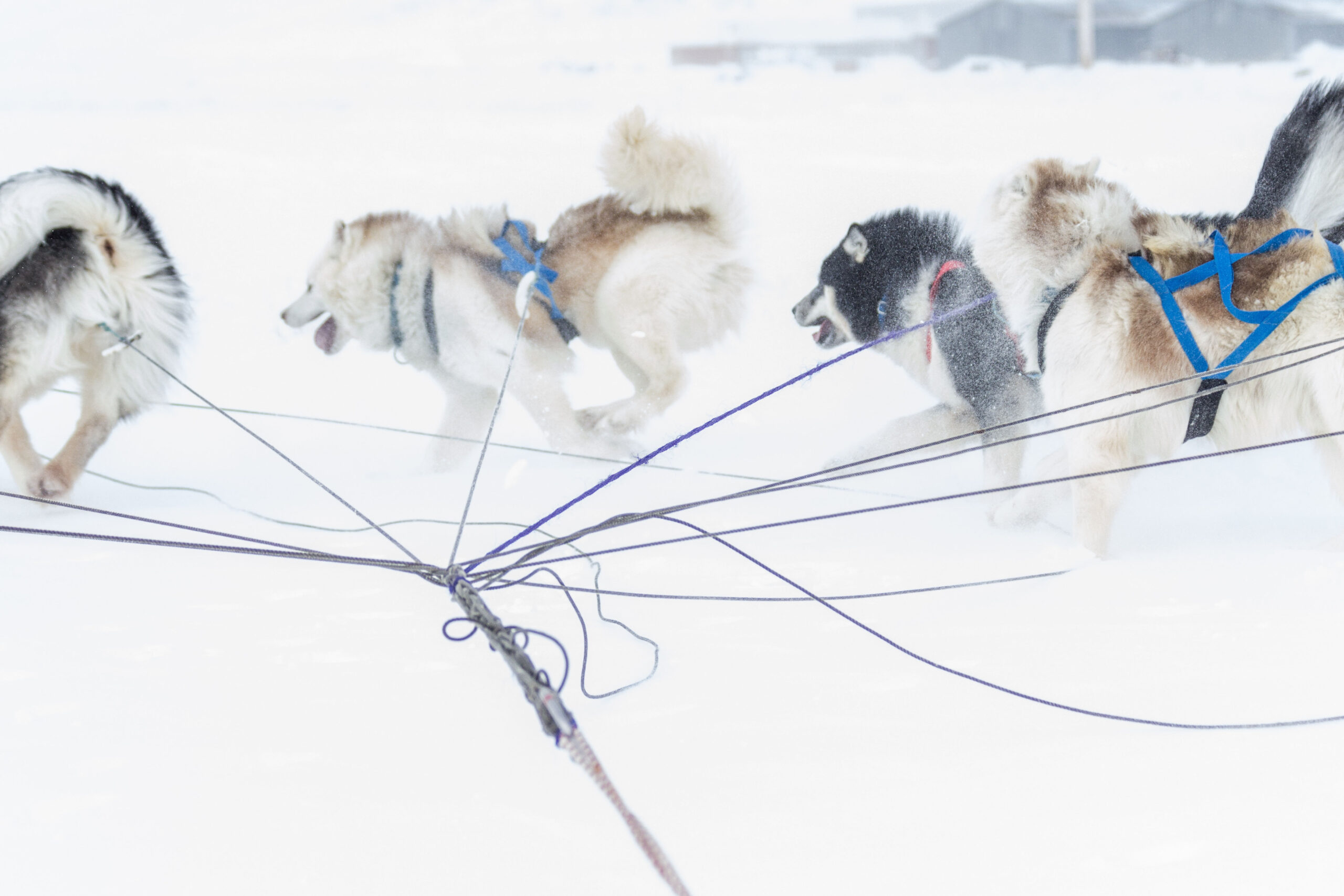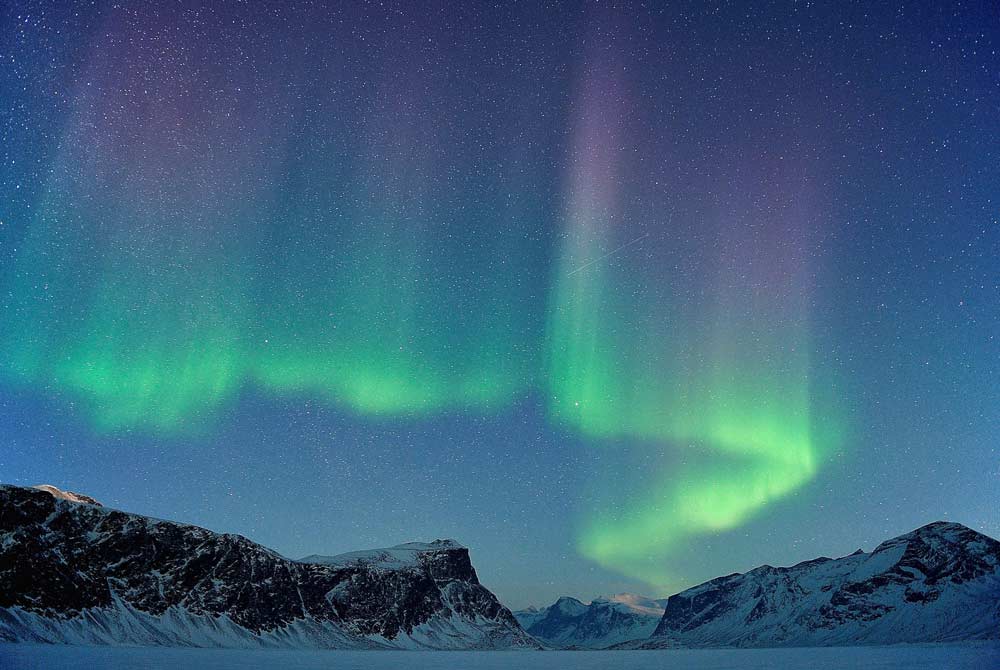Resolute is known as ‘Qausuittuq’ in Inuktitut, which means the ‘place with no dawn’ because of the long winter night this far north.
Resolute is the second most northerly community in Nunavut and Canada. It is sometimes called Resolute Bay, after its bay, the waterway into Parry Channel on the southern coast of Cornwallis Island, right in the middle of the Northwest Passage.
Resolute is home to some of the greatest Inuit hunters in the world. This High Arctic hamlet with its excellent airport often serves as a starting point for international scientific research teams and extreme adventure expeditions to the North Pole.
When you visit this special place be prepared for polar conditions. Resolute is situated so far north that most times you have to look south to see the Northern Lights!
242
80% Inuit
Inuktitut, English
Longitude 94° 59’ W
Latitude 74° 43’ N
Elevation 66m
The terrain near Resolute has rocky coastal bluffs and gravel flats along its shoreline, with rolling hills, deposits of glacial moraine and several small lakes nearby.
Weather & Climate
Summer temperatures rise above freezing to 8°C. The snow starts to accumulate in September. Winter temperatures, December to April, range between -20°C and -40°C. The average temperature here is -13°C. The long winter night lasts from mid-November to February. It is often very windy and it’s arid here, with limited precipitation.
| Average Temperature in Resolute | |||
|---|---|---|---|
| January | -32oC | February | -33oC |
| March | -31oC | April | -23oC |
| May | -11oC | June | 0oC |
| July | 4oC | August | 2oC |
| September | 5oC | October | -19oC |
| November | -24oC | December | -29oC |
HISTORY
The area around Resolute contains archaeological evidence of being occupied sporadically by Pre-Dorset, Dorset and Thule people from 1500 BC to 1000 AD. However, modern Inuit did not occupy or use this area until the 1953 High Arctic relocation of Inuit people by the Government of Canada during the Cold War.
- Pre-Dorset Culture (‘Saqqaq’): 2500 BC to 500 BC
- Dorset Culture (‘Tuniit’ or ‘Sivullirmiut’): 500 BC to 1500 AD
- Thule Culture (Proto-Inuit): 1000 AD to 1600 AD
Canada and the United States jointly built a weather station and airstrip here in 1947, followed by a Royal Canadian Air Force (RCAF) base in 1949. The entire 1950 population of Resolute was composed of military personnel, meteorologists and technical people from the south.
The present Inuit community of Resolute got its hard start in 1953.
Efforts to assert strategic sovereignty in the High Arctic during the Cold War led the Government of Canada to forcibly relocate Inuit families from northern Québec to Resolute. The first group included one Royal Canadian Mounted Police officer, Ross Gibson, who later became the first schoolteacher here. A second group arrived from Pond Inlet in 1955. The Inuit had been promised homes and game to hunt, but the relocated people found few buildings and very little familiar wildlife. They were also told they would be returned home after a year if they wished, but this offer was later withdrawn. The Inuit were forced to stay, so they learned the beluga migration routes and were able to subsist by hunting over a gigantic range of 18,000 square kilometres (6,950 square miles).
The Government of Canada conducted hearings in 1993 to investigate the High Arctic Relocation Program and formally apologized to the Inuit in 2008. The relocation experience was arduous. Fortunately, the brave Inuit people of Resolute are excellent hunters, gifted seamstresses and loving providers for their families.
Resolute remains a vitally important Canadian Forces base of operations and military training because of its strategic location. Immense undersea petroleum resources are being developed in the Arctic Ocean and climate change is opening the Northwest Passage to an ever-increasing volume of international shipping traffic.
ACTIVITIES AND WILDLIFE
The sledding season begins in September and lasts until the middle of June.
This enjoyable outdoor activity is popular here even in the darkest days of midwinter, under twinkling starlight, pale-to-bright moonlight and the dazzling Aurora Borealis. There is continuous 24-hour sunshine here from late April to mid-August, which is a fantastic time to view the seasonal abundance of migratory wildlife species.
In April and May, local guides will safely escort you onto the sea ice to view seals, walruses and sometimes polar bears. Thousands of migratory birds nest on nearby islands in June when the wildflowers begin to bloom, which peak by late July. In the summer, when the char fishing is great, people also like to go beluga whale watching.
ARTS AND CULTURE
Local arts and crafts, unique stone and ivory carvings by the local artists plus beautiful articles of handmade traditional clothing are available at the Tudjaat Co-op and at Resolute Bay Sunset.
Parks
Tupirvik Territorial Park (campground)
Tupirvik provides a great place to camp when visiting Resolute. The park is newly developed, with outhouse facilities, tent pads and fire pits. Signs from the airport lead to the campsite.
Quttinirpaaq National Park
Quttinirpaaq is Canada’s second largest park, located on northern Ellesmere Island.
The sun never sets during the summertime here at the top of the world, with its endless vistas of mountains, fiords and glaciers. Home to muskoxen, caribou, polar bears and walrus, for maximum safety it is recommended that visitors to the park arrive via cruise ship or chartered aircraft from Resolute.
Polar Bear Pass National Wildlife Area
Polar Bear Pass National Wildlife Area is located on Bathurst Island.
Resolute is conveniently close. Polar Bear Pass was established to protect a key travel route for polar bears during the spring and summer.
It also provides vital habitat for muskoxen, caribou, arctic foxes, ringed seals and walruses.



